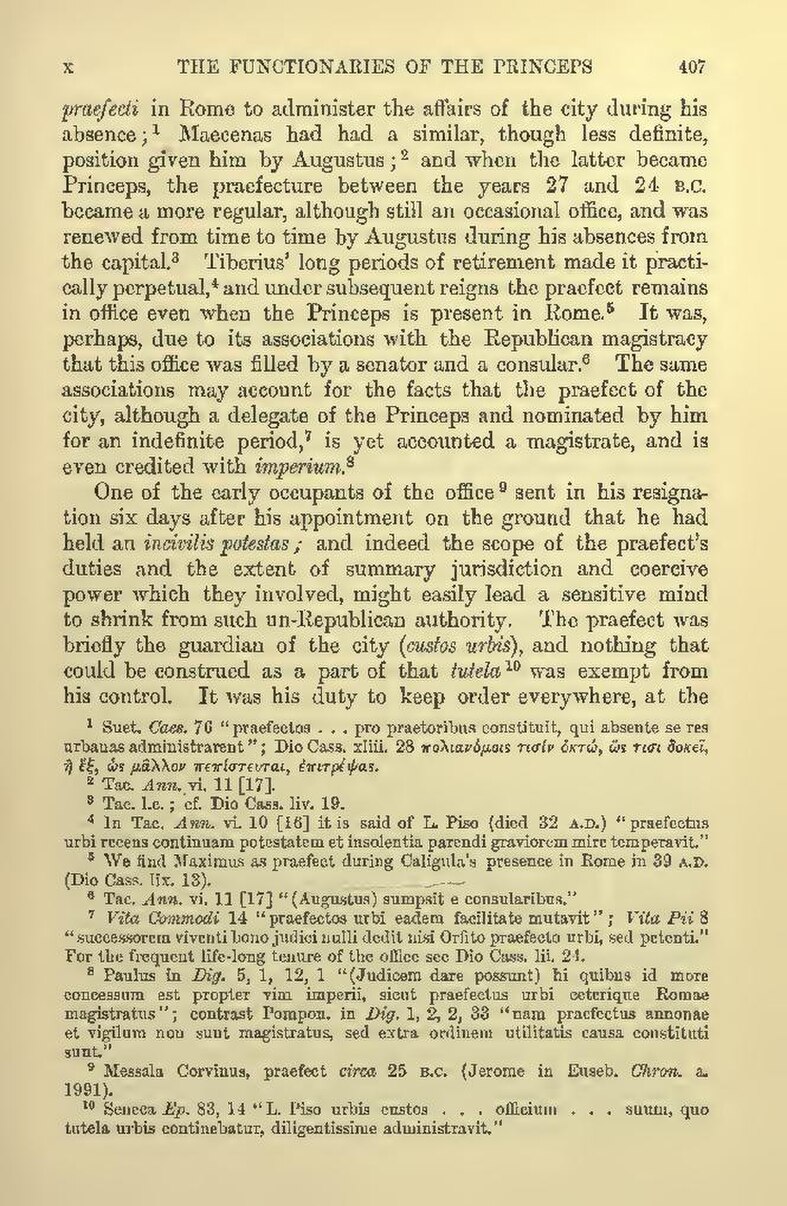praefecti in Rome to administer the affairs of the city during his absence;[1] Maecenas had had a similar, though less definite, position given him by Augustus;[2] and when the latter became Princeps, the praefecture between the years 27 and 24 B.C. became a more regular, although still an occasional office, and was renewed from time to time by Augustus during his absences from the capital.[3] Tiberius' long periods of retirement made it practically perpetual,[4] and under subsequent reigns the praefect remains in office even when the Princeps is present in Rome.[5] It was, perhaps, due to its associations with the Republican magistracy that this office was filled by a senator and a consular.[6] The same associations may account for the facts that the praefect of the city, although a delegate of the Princeps and nominated by him for an indefinite period,[7] is yet accounted a magistrate, and is even credited with imperium.[8]
One of the early occupants of the office[9] sent in his resignation six days after his appointment on the ground that he had held an incivilis potestas; and indeed the scope of the praefect's duties and the extent of summary jurisdiction and coercive power which they involved, might easily lead a sensitive mind to shrink from such un-Republican authority. The praefect was briefly the guardian of the city (custos urbis), and nothing that could be construed as a part of that tutela[10] was exempt from his control. It was his duty to keep order everywhere, at the.].]it is said of L. Piso (died 32 A.D.) "praefectus urbi recens continuam potestatem et insolentia parendi graviorem mire temperavit."]"(Augustus) sumpsit e consularibus."]
- ↑ Suet. Caes. 76 "praefectos . . . pro praetoribus constituit, qui absente se res urbanas administrarent"; Dio Cass. xliii. 28 [Greek: polianomois tisin oktô, hôs tisi dokei, ê hex, hôs mallon pepisteutai, epitrepsas
- ↑ Tac. Ann. vi. 11 [17
- ↑ Tac. l.c.; cf. Dio Cass. liv. 19.
- ↑ In Tac. Ann. vi. 10 [16
- ↑ We find Maximus as praefect during Caligula's presence in Rome in 39 A.D. (Dio Cass. lix. 13).
- ↑ Tac. Ann. vi. 11 [17
- ↑ Vita Commodi 14 "praefectos urbi eadem facilitate mutavit"; Vita Pii 8 "successorem viventi bono judici nulli dedit nisi Orfito praefecto urbi, sed petenti." For the frequent life-long tenure of the office see Dio Cass. lii. 24.
- ↑ Paulus in Dig. 5, 1, 12, 1 "(Judicem dare possunt) hi quibus id more concessum est propter vim imperii, sicut praefectus urbi ceterique Romae magistratus"; contrast Pompon. in Dig. 1, 2, 2, 33 "nam praefectus annonae et vigilum non sunt magistratus, sed extra ordinem utilitatis causa constituti sunt."
- ↑ Messala Corvinus, praefect circa 25 B.C. (Jerome in Euseb. Chron. a. 1991).
